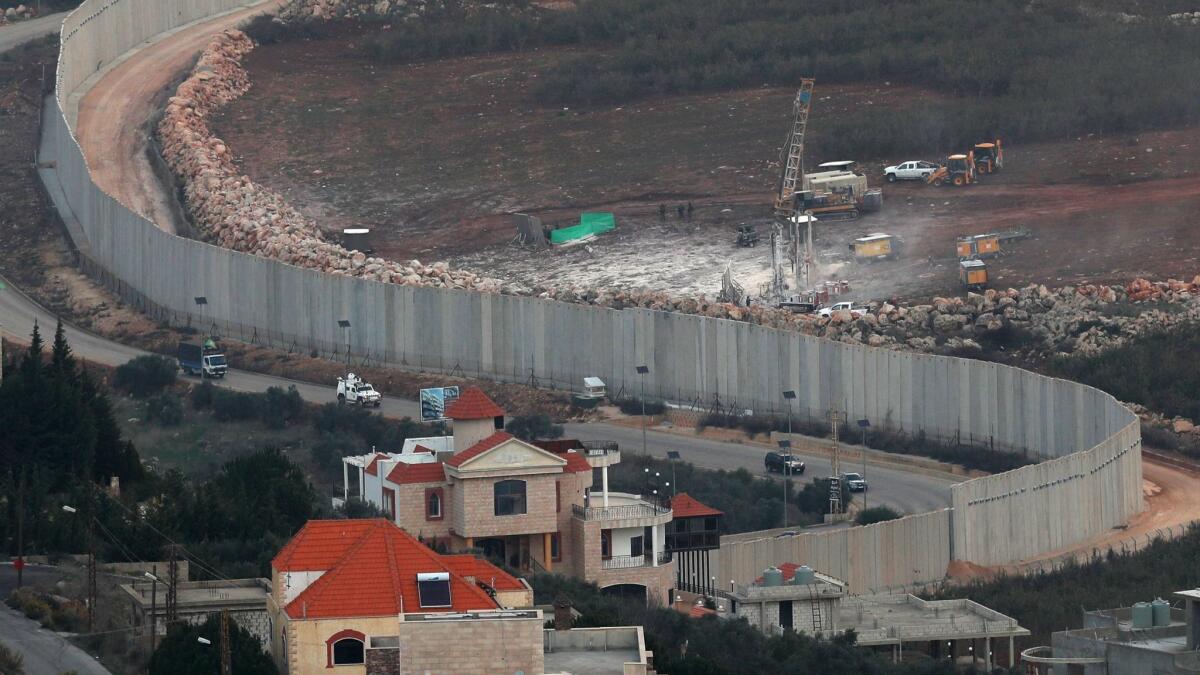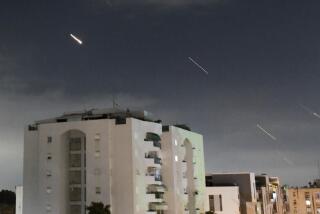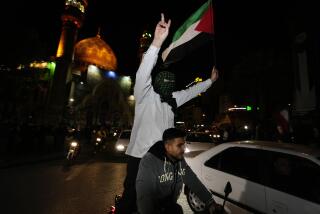Israel launches military operation to thwart Hezbollah border tunnels

Israel launched what it called a major military operation on Tuesday aimed at exposing and disabling tunnels it said Hezbollah — the Shiite militia — dug from southern Lebanon into Israeli territory.
Operation Northern Shield, as the campaign has been named, is targeting an as-yet-undisclosed number of tunnels crossing the Lebanese border, Israeli officials said.
For several years, residents living on the Israeli side of the border have reported strange noises and episodes in which they felt the earth near their homes shake, but this is the first time the Israeli army has acknowledged the existence of any tunnels penetrating its northern territory.
The operation remains confined to Israeli territory and civilians have not been asked to change their daily routines, though the area surrounding Metula, one of Israel’s northernmost cities, was declared a closed military zone.
The Israeli army released a video of the interior of one tunnel and a map showing what it called a “cross-border attack tunnel in the southern area of Kafr Kela,” a Lebanese village. The army said the tunnel was ventilated and wired for electricity and reached about 120 feet into Israel before it was neutralized.
The army said the tunnel was not yet in usable condition and did not pose an immediate threat to Israeli communities.
Israeli Prime Minister Benjamin Netanyahu returned to Israel from Brussels, where he briefed U.S. Secretary of State Michael R. Pompeo on the operation, and praised the soldiers he said were successful in the early stages of the campaign.
“Whoever tries to attack the state of Israel will pay a heavy price,” he said in a statement.
Netanyahu received a mixed reception at home, where police recently recommended charging him on several counts of corruption.
He announced that Israel was taking “determined and responsible action in all sectors simultaneously” and said that the country would “continue with additional actions — open and covert — to ensure the security of Israel.”
In a conversation with journalists, retired Maj. Gen. Yaakov Amidror, Netanyahu’s former national security advisor, said the operation comprised three components: developing the technology to locate the tunnels, determining how to respond to their threat, and understanding “the international frame within which we are acting, because we know the ball is now in the Hezbollah’s court and the response to their response might be devastating.”
In Lebanon, the state-run National News Agency reported the army and U.N. peacekeeping forces had “observed from their positions” on the border. The U.N. also dispatched patrols on the border fence.
Later, the National Council for Audiovisual Media issued a statement dismissing the Israeli operation as a “campaign of threat and intimidation against Lebanon.”
“Most likely, the president of the Israeli government Benjamin Netanyahu sought to divert attention from the corruption probe,” said the statement, adding that the “true danger in Lebanon is represented by the Israeli enemy.”
The legal gantlet faced by Netanyahu was also noticed in Israel.
Ofer Shelah, a member of the centrist Yesh Atid party that opposes Netanyahu, said that while the military operation was justified, the bombastic rhetoric announcing it was not.
“Netanyahu is sowing fear in order to distract. The Israeli army and the public are much more sober and calm than he is,” he said in a radio interview.
Central Combat Media, a Hezbollah affiliated social media account, released pictures from Lebanese villages near the border that showed Israeli troops and what it said were four bulldozers working alongside the fence.
The group reported the situation was “very normal” in the villages despite the presence of Lebanese army and U.N. peacekeeping forces.
Israeli army spokesman Brig. Gen. Ronen Manelis said the army planned to release more detailed information and that Israel had been monitoring the shifting situation along the border for years.
Israel has been beefing up its border with Lebanon for several years, since concerns began to mount that Iran was transferring its weapons-building facilities from Syria, where Israel has regularly attacked convoys of weapons being delivered to Hezbollah, into Lebanese territory.
Iran and Hezbollah, with Russia, are the main backers of Syrian President Bashar Assad, who has been embroiled in a bloody civil war for eight years.
Israeli defenses include a seven-mile border wall along one section of its border with Lebanon and steeply carved artificial cliffs intended to make “the penetration [into Israel] much more controlled and creating potential killing zones to ambush the enemy,” said the former army spokesman, retired Lt. Col. Peter Lerner.
Upon returning to Israel, Netanyahu said that Iranian aggression “had to be thwarted in Syria, Iraq, Lebanon and elsewhere.”
The Israeli foreign ministry said the operation was expected to “continue as necessary.” In talking points distributed to Israeli diplomats, the ministry said the tunnels constitute “a severe attack on Israel’s sovereignty and a further violation of UNSC Resolutions 1701 and 1559,” that define conditions along the volatile border between Lebanon and Israel.
UNIFIL, the United Nations peacekeeping force that supervises the area, said in a statement that the overall situation in its area “remains calm” and that it was working to maintain stability.
U.N. forces, it said in a statement, have increased patrols along the Blue Line and liaison teams are in contact with Israeli and Lebanese officials.
Tarnopolsky is a Times special correspondent. Times correspondent Nabih Bulos in Beirut contributed to this report.
UPDATES:
10:25 a.m.: This article was updated with additional information, including specific details about the tunnels.
This article was originally published at 8 a.m.
More to Read
Start your day right
Sign up for Essential California for news, features and recommendations from the L.A. Times and beyond in your inbox six days a week.
You may occasionally receive promotional content from the Los Angeles Times.






